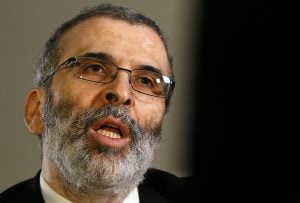By Libya Herald reporters.

Tripoli, 1 November 2016:
Mustafa Sanalla has used the London economic crisis conference to launch an urgent pitch for immediately protection of the country’s oil export terminals and access to the $2.5 billion funding it needs for new investment next year.
The subtext of the National Oil Corporation’s boss statement will be seen as a clear insistence that the state oil company obtains access to its own funds rather than needing to still go cap in hand to the government every time it wants to spend a dirham. This inefficient Qaddafi-era system meant that at times NOC even defaulted on international loan repayments because the finance ministry had not made over the necessary funds.
Sanalla said there were thee key conditions that had to be met if NOC’s share of Libyan oil production was to hit 800,000 bpd and 2,750 Million Standard Cubic Feet per Day (MMSCFD) of gas.
“First, the ports and pipelines that are currently open must stay open; second, the blockade of the Riyayna pipeline [currently interdicted by the Zintanis] must be lifted and third, NOC’s budgetary requirements must be met.”
Sanalla recently insisted that NOC have free access to part of the oil income and equally should be able to borrow to fund itself.
He has clearly taken the opportunity of the economic crisis talks in London to drive home his point.
“Assuming a Brent oil price of $45 a barrel for most of next year,” he said, “plus ancillary revenue from petrochemicals and oil products, this [his projected production] will generate revenue for the country of $15.847 billion.”
He said that the 2017 $2.5 billion planned budget would generate $4.125 billion in extra NOC revenues which would be carried forward into future years.
“Therefore, I do not believe that the concerned parties can responsibly decide not to make these payments,” he said. He warned that if it did not get the budget it needed, NOC’s share of crude oil production would be only 520,000 bpd, generating revenues of $11.72 billion.
Sanalla explained that he had taken part in parallel technical talks in London today while ministerial-level talks went on elsewhere in the British foreign office.
He said that Libyan production of crude oil had increased from around 290,000 bpd in mid-September to around 590,000 bpd currently, compared with 1.5 million bpd after the Revolution and before the 2013 blockades of key oil ports by the Petroleum Facilities Guard of Ibrahim Jadhran which he has said had cost Libya $100 billion.










